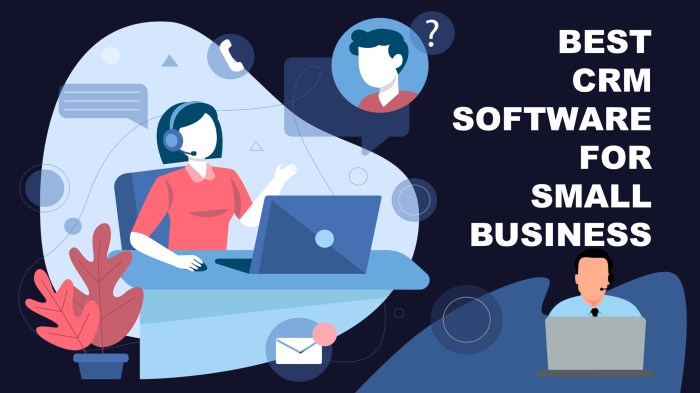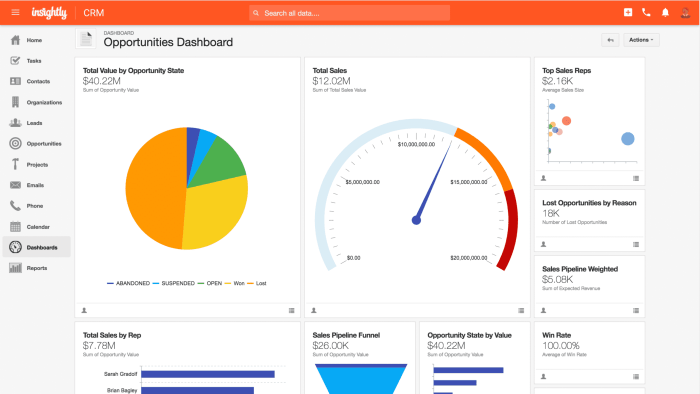Crm softwares for small businesses – In today’s competitive business landscape, managing customer relationships effectively is paramount for success. For small businesses, this often means juggling multiple tasks and wearing many hats. Customer Relationship Management (CRM) software can be a game-changer, streamlining processes, improving customer engagement, and ultimately boosting revenue. This comprehensive guide explores the benefits, features, and considerations for choosing the right CRM software for your small business.
Understanding the Importance of CRM for Small Businesses
Small businesses often operate with limited resources and personnel. A well-implemented CRM system can significantly alleviate the pressure by centralizing customer information, automating tasks, and providing valuable insights. This allows business owners and their teams to focus on strategic growth rather than getting bogged down in administrative details. The benefits extend beyond simple organization; a robust CRM fosters stronger customer relationships, leading to increased loyalty and repeat business.
Key Benefits of CRM for Small Businesses:, Crm softwares for small businesses
- Improved Customer Relationship Management: Track interactions, preferences, and purchase history to personalize communication and offer targeted support.
- Enhanced Sales Productivity: Automate sales processes, manage leads effectively, and track sales performance to identify areas for improvement. This includes features like sales pipeline management and opportunity tracking.
- Increased Efficiency and Productivity: Automate repetitive tasks such as email marketing, appointment scheduling, and data entry, freeing up time for more strategic activities.
- Better Customer Service: Provide quick and efficient support by accessing comprehensive customer information instantly. This leads to higher customer satisfaction and retention.
- Data-Driven Decision Making: Gain valuable insights into customer behavior, preferences, and trends through comprehensive reporting and analytics. This allows for informed business decisions.
- Improved Team Collaboration: Centralized information ensures all team members have access to the same data, promoting seamless collaboration and reducing communication silos.
Choosing the Right CRM Software: Key Features to Consider
The market offers a wide array of CRM software solutions, each with its own set of features and pricing models. Choosing the right one depends on your specific business needs and budget. Here are some key features to consider:
Essential CRM Features for Small Businesses:
- Contact Management: Store and manage customer information, including contact details, communication history, and purchase history. Look for features like custom fields for storing relevant business-specific data.
- Lead Management: Track and nurture leads throughout the sales pipeline, automating follow-up communications and scoring leads based on their potential. This often involves lead scoring and lead nurturing workflows.
- Sales Pipeline Management: Visualize the sales process, track deals, and identify bottlenecks. This helps in forecasting sales and improving sales team performance.
- Marketing Automation: Automate marketing tasks such as email marketing campaigns, social media posting, and SMS messaging. Integration with marketing automation platforms is highly beneficial.
- Customer Support and Service Ticketing: Manage customer inquiries and resolve issues efficiently. Look for features like ticketing systems, knowledge bases, and live chat integration.
- Reporting and Analytics: Generate reports and dashboards to track key performance indicators (KPIs) and gain insights into customer behavior and sales performance. Customizable dashboards are a valuable asset.
- Integration Capabilities: Ensure the CRM integrates seamlessly with other business applications you use, such as email marketing platforms, accounting software, and e-commerce platforms. API integrations are key here.
- Mobile Accessibility: Access your CRM data from anywhere, anytime, using a mobile app. This ensures you stay connected with your customers on the go.
- Scalability: Choose a CRM that can grow with your business, easily accommodating increased data volume and user accounts as your business expands.
Types of CRM Software for Small Businesses
CRM software comes in various forms, each suited to different needs and budgets. Understanding these differences is crucial for making an informed decision.
Different CRM Software Types:
- Cloud-Based CRM: Accessed via the internet, requiring no on-site server maintenance. This offers flexibility and accessibility but relies on a stable internet connection.
- On-Premise CRM: Installed and maintained on your own servers. This offers greater control and security but requires significant IT infrastructure and expertise.
- Open-Source CRM: Free to use and modify, offering customization options. However, it may require technical expertise for setup and maintenance.
Popular CRM Software Options for Small Businesses
Many excellent CRM solutions cater specifically to the needs of small businesses. Here are a few examples (note that this is not an exhaustive list, and the best choice depends on individual needs):
- HubSpot CRM: A popular and powerful free CRM with a wide range of features and integrations.
- Zoho CRM: A comprehensive and affordable CRM with a user-friendly interface and various pricing plans.
- Salesforce Sales Cloud (Essentials Plan): A scaled-down version of the powerful Salesforce platform, offering core CRM functionalities at a more accessible price point.
- Freshsales: A user-friendly CRM known for its intuitive design and robust features.
- Pipedrive: A sales-focused CRM that simplifies sales pipeline management and lead tracking.
Implementing and Managing Your CRM System
Successfully implementing a CRM requires careful planning and execution. Consider these steps:
Implementing Your CRM:
- Define your goals and objectives: Clearly Artikel what you hope to achieve with your CRM system.
- Choose the right software: Select a CRM that aligns with your business needs, budget, and technical capabilities.
- Data migration: Transfer existing customer data to your new CRM system accurately and efficiently.
- User training: Provide thorough training to your team on how to use the CRM effectively.
- Ongoing monitoring and optimization: Regularly review your CRM usage and make adjustments as needed to maximize its effectiveness.
Frequently Asked Questions (FAQ)
- Q: How much does CRM software cost? A: CRM software pricing varies widely depending on the features, vendor, and number of users. Some offer free plans with limited functionality, while others charge monthly or annual subscriptions based on user tiers and features.
- Q: Is CRM software right for my small business? A: If you struggle to manage customer interactions, track leads effectively, or automate repetitive tasks, then a CRM is likely a valuable investment. Even small businesses can benefit from improved organization and efficiency.
- Q: How long does it take to implement a CRM? A: Implementation time varies depending on the complexity of the CRM system, data migration requirements, and user training needs. It can range from a few weeks to several months.
- Q: What if my business grows? Can my CRM scale? A: Choose a CRM with scalability in mind. Many cloud-based solutions easily accommodate growth by adding users and features as needed.
- Q: What are the key metrics to track with a CRM? A: Key metrics include lead conversion rates, customer acquisition cost, customer lifetime value, customer churn rate, and sales cycle length.
Resources: Crm Softwares For Small Businesses
Call to Action
Ready to take your small business to the next level? Explore the CRM options mentioned above and choose the one that best fits your needs. Start streamlining your processes, improving customer relationships, and driving growth today!

Source: droidtechknow.com
FAQ Overview
What is the average cost of CRM software for small businesses?

Source: productivityland.com
Costs vary widely depending on features, number of users, and vendor. Expect to find options ranging from free plans with limited functionality to several hundred dollars per month for more comprehensive solutions.
How much time does it take to implement a CRM system?
Implementation time depends on the complexity of the system and the size of the business. Simple systems can be implemented in a few weeks, while more complex ones may take several months.

Source: techjockey.com
Do I need technical expertise to use CRM software?
Most modern CRM systems are user-friendly and require minimal technical expertise. Many offer intuitive interfaces and comprehensive training resources.
Can I integrate my CRM with other business tools?
Yes, many CRM systems offer integration capabilities with other software, such as email marketing platforms, accounting software, and e-commerce platforms. This integration streamlines workflows and provides a more holistic view of your business operations.
